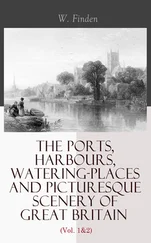In January 1868, while Whicher was hunting down witnesses in Wapping, the first instalment of Wilkie Collins' The Moonstone appeared in All the Year Round . It was an immediate bestseller. 'It is a very curious story,' observed Dickens, 'wild and yet domestic.' The Moonstone , a founding fable of detective fiction, adopted many of the characteristics of the real investigation at Road: the country-house crime in which the criminal must be one of the inmates of the house; the secret lives led behind a veneer of propriety; the bumbling, pompous local policeman; the behaviour that seems to point to one thing yet turns out to point to another; the way that the innocent and the guilty alike act suspiciously, because all have something to hide; the scattering of 'real clues and pseudo clues', as a reviewer described them (the term 'red herring' - something that puts bloodhounds off the scent - was not used to mean 'pseudo clue' until 1884). In The Moonstone , as at Road Hill, the original source of the crime was a wrong done in a previous generation: the sins of the father were visited on the children, like a curse. These ideas were taken up by many of the detective novelists who succeeded Collins, as was the novel's air of uncertainty, what one of its characters calls 'the atmosphere of mystery and suspicion in which we are all living now'.
The story diluted the horror of Road Hill: instead of a child-murder, there was a jewel theft; instead of bloodstains, splashes of paint. Yet the plot borrowed many specifics from the Road case: the stained and missing nightdress; the laundry book that proves its loss; the renowned detective policeman summoned to the countryside from London; a house-hold that shudders at his invasion; the indelicacy of a lower-class man accusing a middle-class girl. Most significantly, it translated Whicher into the prototypical detective hero, 'the celebrated Cuff'. ('To cuff', in contemporary slang, was to handcuff.) The seventeen-year-old Robert Louis Stevenson, when he read the novel that year, wrote to his mother: 'Isn't the detective prime?'
Physically, Sergeant Cuff is a papery, hawkish old thing, quite unlike Whicher. In character, though, they are akin. Cuff is melancholy, sharp-witted, enigmatic, oblique - he has 'round-about' and 'underground' ways of working, by which he lures his sources into disclosing more than they intend. His eyes 'had a very disconcerting trick, when they encountered your eyes, of looking as if they expected something more from you than you were aware of yourself'. Cuff is after unconscious secrets as well as facts that are deliberately withheld. He acts as a foil to the novel's sensation, a thinking machine to interpret the palpitations and pulsings of the other characters. By identifying with Cuff, readers could shield themselves from the thrills they sought - the story's untrammelled emotion, the tremble of danger. The fever of feeling was transmuted into the 'detective-fever' that burnt in the novel's characters and its readers, a compulsion to solve the riddle. In this way the detective novel tamed the sensation novel, caging the emotional wildness in an elegant, formulaic structure. There was madness, but it was mastered by method. It was Detective Sergeant Cuff who made The Moonstone a new kind of book.
Yet Cuff, unlike the detectives he inspired, gets the solution wrong: 'I own that I made a mess of it,' he says. He is mistaken in believing that the criminal is the daughter of the house - the secretive, 'devilish self-willed', 'odd and wild' Miss Rachel. She turns out to be more noble than his policeman's nature can understand. In so far as it reflected the events at Road Hill, the novel ignored the official solution - Constance Kent's guilt - and instead gave voice to the unease that still surrounded the story. It aired the notions of somnambulism, unconscious deeds, double selves that the Road case had aroused, the dizzying whirl of perspectives that had been brought to bear upon the investigation. The solution Collins gave to the mystery of the moonstone was that the odd and wild Miss Rachel had drawn suspicion to herself in order to protect someone else.
In 1927 T.S. Eliot compared The Moonstone , favourably, to the fiction of Edgar Allan Poe and Arthur Conan Doyle:
The detective story, as created by Poe, is something as specialised and as intellectual as a chess problem, whereas the best English detective fiction has relied less on the beauty of the mathematical problem and much more on the intangible human element . . . the best heroes of English detective fiction have been, like Sergeant Cuff, fallible.
In his lifetime, Collins was often dismissed as a master of plot with little aptitude for depicting his characters' interior lives. By comparison with novelists such as George Eliot, he built his stories from the outside rather than from within. Henry James characterised them as 'monuments of mosaic art', then amended this: 'They are not so much works of art,' he said, 'as works of science.'
In May 1866 Samuel Kent renewed his plea to the Home Office to retire on his full salary, which had risen to PS500 when he completed thirty years' service that April. Since Saville's death, he explained in his letter, the family had experienced 'indescribable pain and anguish greatly aggravated by the disclosures which the penitence of his daughter Constance ultimately constrained her to make'. His attempts to find the murderer and shield his family, he said, had left him in debt. The health of his second wife was 'entirely shattered' - Mrs Kent was losing her sight and had fallen prey to a 'hopeless and helpless paralysis', so he had to nurse her and tend to their four young children.
In August, to his dismay, the Home Office granted Samuel a pension of PS250, half of what he had requested but the maximum the rules allowed. He desperately backtracked, begging to withdraw his resignation - he would continue working, he said; he had not intended to resign, only to enquire into the possibility; he could not manage on so little money. The Home Office questioned whether he was fit to discharge his duties. Yes, he replied at the end of August: he no longer needed to nurse his wife - Mary Kent, nee Pratt, had died earlier in the month aged forty-six, of congestion of the lungs.
The Home Office allowed Samuel to continue as a sub-inspector. That summer he was awarded PS350 damages by the Edinburgh Daily News for an article that had portrayed his second wife as common and cruel. With the four surviving children of his second marriage - Mary Amelia, Eveline, Acland,Florence - Samuel went north to the small Welsh town of Denbigh, where he employed an Australian governess and two other servants. His eldest daughters, Mary Ann and Elizabeth, moved to London together. William also headed for the capital city, with the PS1,000 inheritance he had secured on his twenty-first birthday in July.
Through the winter of 1867, William took evening classes at King's College, where he studied the 'new science' being forged by Darwin and others. William's passion was microscopy, and by the end of the year he had been elected a Fellow of the Microscopical Society. The biologist Thomas Huxley, one of the most influential scientists of his time, became William's sponsor. He encouraged the young man to investigate infusoria, single-celled water bacteria visible only through a magnifying lens.
Huxley was known as 'Darwin's bulldog' for his ardent advocacy of the natural historian's ideas. He gave the name 'retrospective prophecy' to the process of imagining the past by observing the present. A natural historian sought to see into the past as a prophet saw into the future - 'Would that there were such a word as 'backteller'!' said Huxley. In a lecture to working men in 1868, he took the piece of chalk he was holding as the starting point for an account of the geological history of the earth. 'A small beginning,' he concluded, 'has led us to a great ending.' From the tiny, a world could unfold.
Читать дальше












